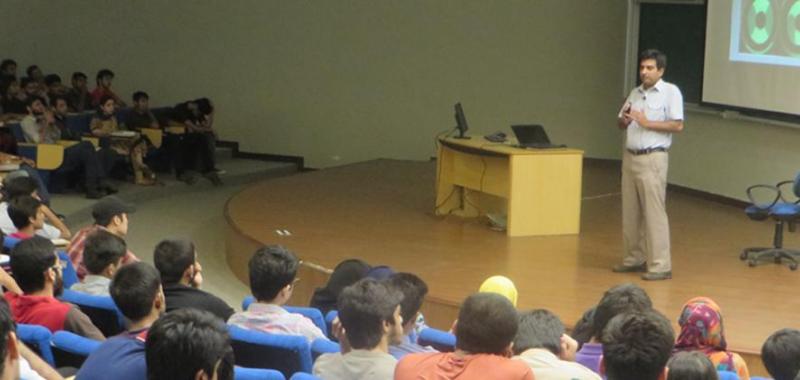
"What I like about experiments is that these can quickly become a personal affair of joy, patience and resilience. Your lab notes reflect your personality. The hissing of a vacuum pump can become an impending alarm about a leakage in your pumping lines, the sudden popping up of traces of current from a photodetector can make you jump to far oft conclusions, or the graphical plotting of seemingly meaningless data can reveal some hidden pattern that would otherwise go unnoticed. Where else can all of these feelings unsettle your thoughts, for the good or the bad, than inside the laboratory?"
Dr. Sabieh Anwar, Associate Professor at the LUMS Department of Physics welcomed the class of 2019 through a motivational lecture on experimental physics. This lecture was part of the PHY100 course in Experimental Physics, a core requirement for science and engineering students. The audience were introduced to the idea of measurement and the key characteristics of the experimental culture. He apprised students of how the act of data collection and interpretation can transform into an ultimate source of personal gratification. Dr. Anwar described that the multi-disciplinary physics laboratories at the SBASSE are meant to provide students a glimpse into modern tools and instruments, the art and science of taking measurements, quantifying the limits thereof, observing stringent safety protocols, and using experiments as an impetus to creativity.
Dr. Anwar also grazed through laboratory diaries of Graham Bell and Micheal Faraday, the latter being, arguably the most celebrated experimenter of all times. It is through experimental science that we could stand in the league of the greatest minds and most adroit technicians who have nurtured the edifice of science and technology.
The physics course PHY100 comprises a set of carefully designed formal experiments, and an optional track called the physics studio. In the 2015 offering, the course will comprise a series of eight preparatory lectures geared towards a general science-savvy audience, two weeks of computer-based practice in data processing and analysis and finally, a suite of experiments that will touch upon ideas from all across the physical sciences.
The course will be taught by Dr. Sabieh Anwar, Junaid Alam, Azeem Iqbal, Muzamil Shah and Mehran Rasheed, and assisted by a team of demonstrators. It will culminate in the form of an exhibition for students taking the studio track.







